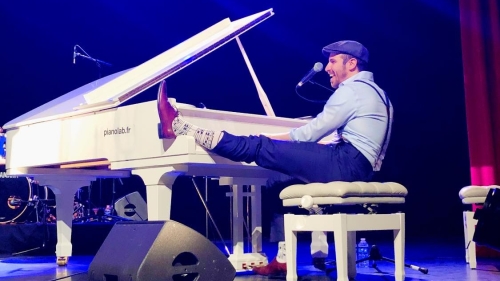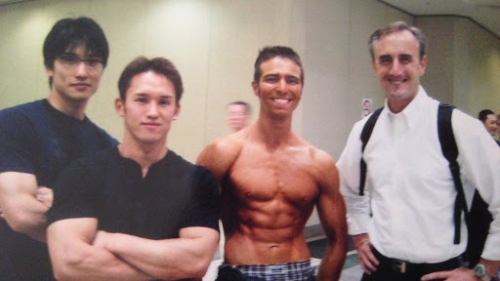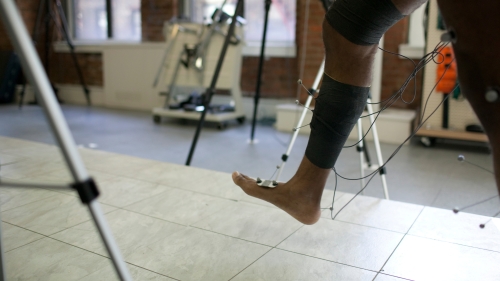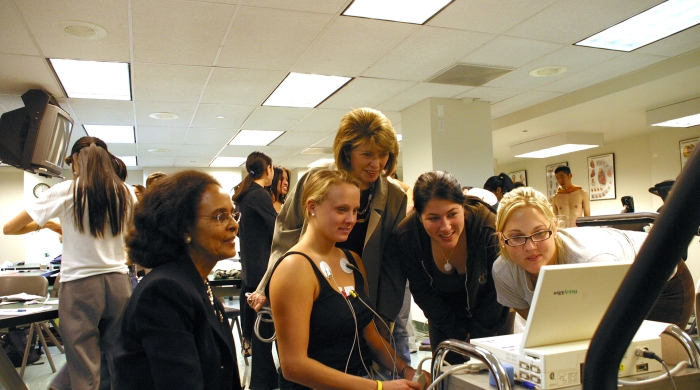Meet Arthur Migliazza, a new Doctor of Physical Therapy (DPT) student in the Department of Physical Therapy – and an award-winning pianist who has performed on some of the world’s most famous stages. We caught up with Arthur to learn more about the intersection of his passion for music and movement and his motivation for becoming a physical therapist (PT).

Arthur performing at the 2020 International Boogie Woogie Festival in Paris, France.
Could you tell us a bit about your career as a pianist? What would you consider your biggest accomplishment as a musician?
I began playing the piano professionally at the age of 13, and for the last 27 years, it has been my full-time career. Shortly after starting piano lessons I discovered the blues and boogie woogie piano styles – I was hooked!
I feel very honored to have traveled extensively throughout the US and overseas as somewhat of an ambassador of this wonderful music, and nothing thrills me so much as seeing first-hand how people all around the globe respond to it. One of the biggest surprises was when I did my first tour of Russia in 2013. I was with two other piano players on a tour called “The Kings of Boogie” sponsored by the US Embassy. Our first show was at Tchaikovsky Hall in Moscow (the Russian version of Carnegie Hall so to speak), and it was sold out. Not only that, but in every city where we played in a similar concert hall, those performances were all sold out too. I felt like a member of the Beatles! It was a big eye-opener for me to see that even with the history of the US and Russia being as it is, music is a very powerful common ground. That notion really sunk in for me that first night in Moscow.
That is an amazing story! So when did you first encounter the field of physical therapy?
I began weightlifting in college, but it wasn’t until I moved to Hiroshima, Japan in 2002 that I found a serious and knowledgeable trainer. With his mentoring, I won the 2003 Mr. Hiroshima bodybuilding competition (novice class). A dedication to lifting weights rarely comes without its share of injuries, and a few years later I found myself in a physical therapy clinic for a shoulder injury.

“Team Arthur” (Arthur at center) at the 2003 Mr. Hiroshima bodybuilding competition in Japan.
What inspired you to pursue your DPT and become a physical therapist yourself?
As I began experiencing the very powerful and positive effects of PT in my own life, it sparked an interest in understanding how the systems of the human body work together to create movement. My PT was great about explaining things to me, which fit nicely with my irresistible urge to ask a million questions. But he always ended each session by saying, “You know Arthur, you would be good at this if you ever decide to expand your horizons beyond music.”
I would always dismiss those remarks because it never really occurred to me that I had the power to actually go back to school and learn anything new. Those seeds he planted eventually grew into the realization that not only was I passionate about PT, but I did indeed have the power to go back to school and learn all about it!
What has been the most exciting part of being in the program so far?
I am so excited to be learning about a subject I am truly passionate about that I really feel like a new person. The dedicated (and in some cases, legendary) faculty at NYU, coupled with my classmates, who are equally as motivated to learn and passionate about PT as I am, make this program better than I could have ever hoped for.
How do you think your perspective as a musician will influence your approach to studying and ultimately practicing physical therapy?
When musicians work together to create music, several things come into play. First, you have to know what your own role is in the ensemble. You also need the discipline to practice your part on your own and show up well-prepared to the rehearsal or performance. In the style of music I play, improvisation and responsiveness are also very important elements, requiring a high level of concentration as well as the ability to be present in the moment.
Aside from the musical aspect, there is also the business aspect of sustaining a career as a full-time musician. You need to be well-organized and outgoing (to book shows), have a sense of time and money management, and also be able to handle rejection and criticism. On top of that, there is the personal interaction with band members, “industry people,” my piano students, and the general public that can add an extra level of fulfillment and challenge.
All in all, I feel that being a musician has taught me how to interact with people from all walks of life in a respectful and productive way, and to stay on my toes in adapting to unexpected situations, both on the stage and off. So far, these experiences seem to have helped me make a successful transition back to school life and I expect that my interpersonal experiences will be helpful when I eventually start working with patients.
As I began experiencing the very powerful and positive effects of PT in my own life, it sparked an interest in understanding how the systems of the human body work together to create movement.
What do you hope to achieve as a physical therapist?
In the future, I hope to specialize in providing affordable and effective physical therapy for musicians. Overall, I feel that musicians are an “underrepresented demographic” in the PT world, and I hope to change that. Each musical instrument requires a unique body position and fine motor skills, and I know from experience that musicians’ bodies can take a beating from hours and hours of practice, day after day, year after year.
I also hope to be involved in the global conversation of what shapes our profession, as well as the processes of defining best practices and standards of physical therapy treatment. I’ve never really been a “rank and file” type of person, so I hope to play an active part in advancing the PT profession in whatever capacity I am able to.
About the DPT Degree
Related Department

Physical Therapy
380 Second Avenue, Fourth Floor
New York, NY 10010
Phone: 212-998-9400
Email: steinhardt.pt@nyu.edu

